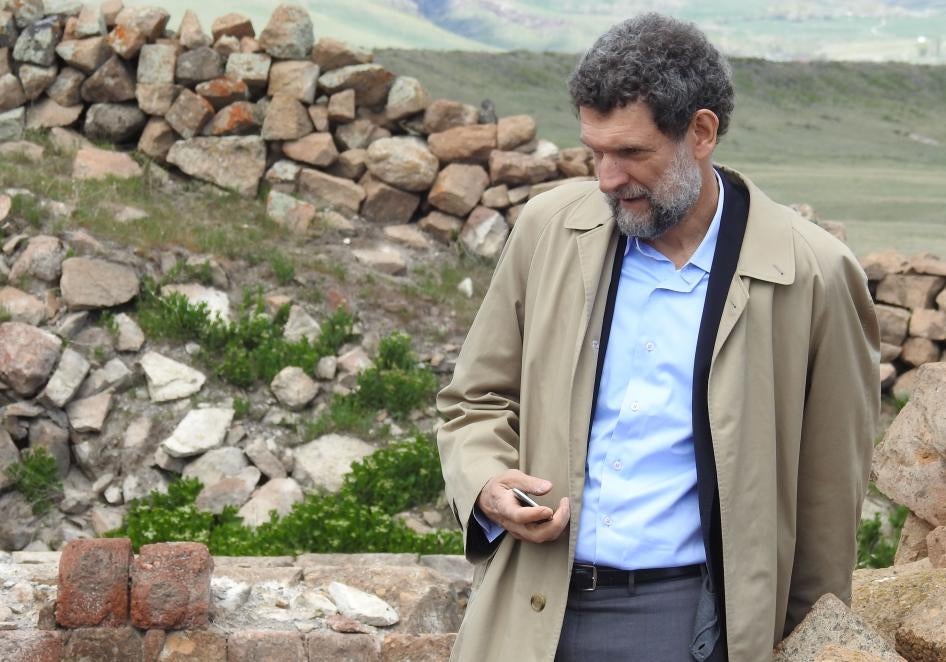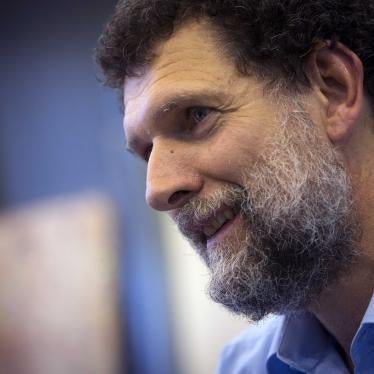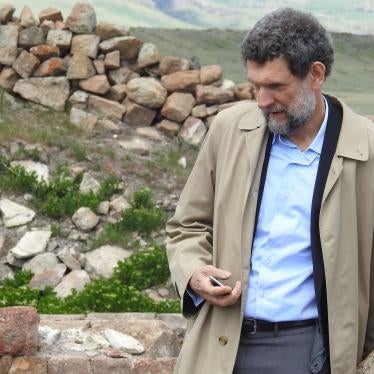(Istanbul) – The Council of Europe’s Committee of Ministers decision notifying Turkey it will start infringement proceedings over its failure to comply with the European Court of Human Rights’ (ECtHR) order to free the jailed human rights defender Osman Kavala is a welcome step, Human Rights Watch, the International Commission of Jurists, and the Turkey Litigation Support Project said today. The three organizations have repeatedly recommended this necessary response in submissions to the Committee over the past year.
In its decision announced on December 3, the Committee states that it “serves formal notice on Turkey of its intention, at its 1423rd meeting on 2 February 2022, to refer to the [European] Court … the question whether Turkey has failed to fulfil its obligation” to implement the European Court of Human Rights Kavala judgment and “invites Turkey to submit in concise form its view on this question by 19 January 2022 at the latest.”
This means that at its February 2, 2022 meeting, the Committee will proceed with the infringement procedure by reverting to the European Court of Human Rights to ask the Court to provide an opinion on whether Turkey has failed to implement the judgment. If the Court agrees that it has, the Committee may then order further measures against Turkey. The Committee’s decision to give Turkey the opportunity to respond to the Committee’s decision by January 19, 2022 is conveniently timed two days after the next trial hearing against Osman Kavala and gives Turkey the opportunity to begin to comply with the European Court decision by releasing Kavala before the infringement process advances.
“In the face of Turkey’s defiance of its obligation to carry out a key judgment of the European Court of Human Rights, the Committee of Ministers has taken the right course in notifying Turkey that it will trigger infringement proceedings,” said Aisling Reidy, senior legal adviser at Human Rights Watch. “As this is only the second time the Council of Europe has triggered such a sanction process against a member state, the decision is an acknowledgement of Turkey’s rule of law crisis.”
The European Court ruled on December 10, 2019, that by holding Kavala in pretrial detention since November 2017 and prosecuting him on the basis of his human rights activities, the Turkish authorities had “pursued an ulterior purpose, namely to silence him as a human rights defender.” The court found that by using detention for political ends, Turkey had violated Kavala’s rights, including the right to liberty, and had abused the discretion given to governments to impose legitimate limitations on rights (articles 5 and 18 of the European Convention on Human Rights respectively). The court took the rare step of ordering Osman Kavala’s immediate release.
The Kavala judgment is legally binding, yet the Turkish authorities have snubbed the Strasbourg court and ignored the decisions of the Committee of Ministers, representing the Council of Europe’s 47 member states, calling for his release and the full restoration of his rights.
The Turkish courts and prosecutors have engaged in a series of tactics to circumvent the authority of the European Court and the Council of Europe. They have issued sham release orders, initiated multiple criminal proceedings against Kavala on the same facts, disjoined and re-joined case files accusing him of bogus offenses.
Most recently, Turkey merged the proceedings against Kavala with an entirely separate and much older case against football fans and others charged with a demonstration during 2013 protests a few kilometers away from Istanbul’s Gezi Park. All the domestic court decisions have been for the aim of prolonging Kavala’s detention and extending the life of baseless prosecutions.
“The Committee addresses in strongest terms Turkey’s notorious failure to implement the European Court’s clear judgment and release the human rights defender Osman Kavala. It is a further striking reminder to Turkey, by other member states, of its commitments to the Council of Europe and obligation to implement the binding judgments of the Court.” said Ayse Bingol Demir of the Turkey Litigation Support Project. “At a time that the international human rights protection mechanisms are globally challenged, it is extremely valuable for the international community to see that the Council of Europe member states are adamant in prioritizing human rights and willing to take even the most challenging decisions to ensure due protection. This decision is a strong tool that needs to be used by all relevant actors to increase pressure on Turkey to end its problematic human rights practices, the first step of which being the immediate release of Osman Kavala.”
The Committee of Ministers has the authority to take infringement proceedings against a Council of Europe member state that refuses to carry out European Court judgments. It was used for the first time in 2017 when the government of Azerbaijan repeatedly refused to secure the unconditional release of a wrongfully jailed opposition politician, Ilgar Mammadov.
Infringement proceedings are provided for under article 46/4 of the European Convention on Human Rights. A vote of two-thirds of the Committee of Ministers is needed to start infringement proceedings. Once the process is triggered, the case reverts to the European Court for a further opinion on whether the state has met its obligations to comply with the judgment. If the European Court confirms that Turkey has failed to carry out the ruling, the Committee of Ministers may then take additional measures, including ultimately suspending Turkey’s voting rights or membership of the Council of Europe.
“Once again, we call for the immediate release of Osman Kavala, cleared of all charges. Judgments of the European Court of Human Rights must be complied with and not intentionally eluded,” said Massimo Frigo, Senior Legal Adviser of the International Commission of Jurists, “The Committee’s decision to trigger infringement proceedings means that implementation of this judgment is key for the effectiveness of the European human rights system and a further demonstration of the dire systemic crisis of Turkey’s rule of law.”









